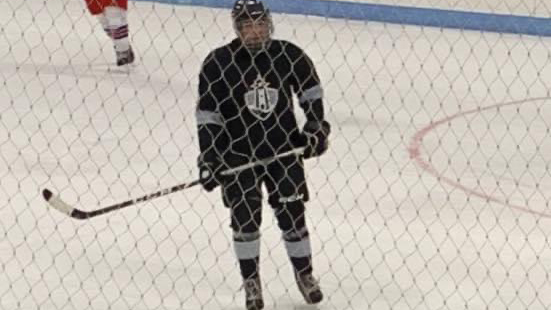Diversity and inclusion survey offers advice for Hockey Nova Scotia
Ideas include funds for underrepresented groups, ban on chirping

caption
Red tape symbolizes zero tolerance towards racismHockey Nova Scotia’s diversity and inclusion task force is hearing finances, scheduling and sense of belonging are the main issues faced by underrepresented groups.
Hockey Nova Scotia, the governing body of amateur hockey in the province, launched a survey to solicit opinions from people in Indigenous, African-Nova Scotia, LGBTQ2+ and other underrepresented communities.
“The work so far has been to go to the first voice; they will have the answers as to how do we address racism and discrimination in the game,” Dean Smith, chair of the diversity and inclusion task force, said in an interview.
The survey was launched on Sept. 28. By the time it closed on Nov. 1, the task force had 800 responses.
The task force is coming up with recommendations to tackle inequality and discrimination based on those responses. One of the ideas from the survey is to have targeted funding for underrepresented groups, while another is to open recreational leagues to everyone, Smith said.
Logan Prosper, a 17-year-old hockey player from Whycocomagh, is hoping the task force finds ways to fight racism in hockey.
In 2016, Prosper was the target of a racial slur. In 2019, it happened again while he was playing for the Midget U-18 A Cape Breton West Islanders. It was a game against the Northside Vikings.
“Someone grabbed me and told me ‘You look like a turd in a helmet; all natives look like turds in helmets,’” Prosper said in an interview Tuesday.

caption
Logan Prosper skates down the corner of the ice to the puckAfter the incident, Prosper’s family filed a complaint with Hockey Nova Scotia.
Prosper said many people from underrepresented communities thanked him for coming forward.
“It felt really good to know that I was making change,” he said.
An end to chirping?
Smith said one idea that came up in the survey is to ban chirping. Chirping, like trash-talking, is a way for athletes to get under the skin of an opponent.
“It’s a game of physical skill and ability,” Smith said. “Why are we chirping?”
For Prosper, banning chirping doesn’t go far enough.
“You can give them a suspension that won’t teach them,” he said. “Before any kid joins hockey, they should take a course to see where their heads are and educate themselves.”
Prosper supports suspensions for racist incidents, but he would also like to see players educated to understand the bigger picture of systemic racism.
The diversity and inclusion task force continues to develop a plan, but the final decision will depend on Hockey Nova Scotia.
“It’s going to be Hockey Nova Scotia’s responsibility to accept and to action the recommendations,” Smith said. “Our mandate is to come up with recommendations to improve the game, to make it more safe and welcoming.”
The official recommendations are expected to be released in January.
